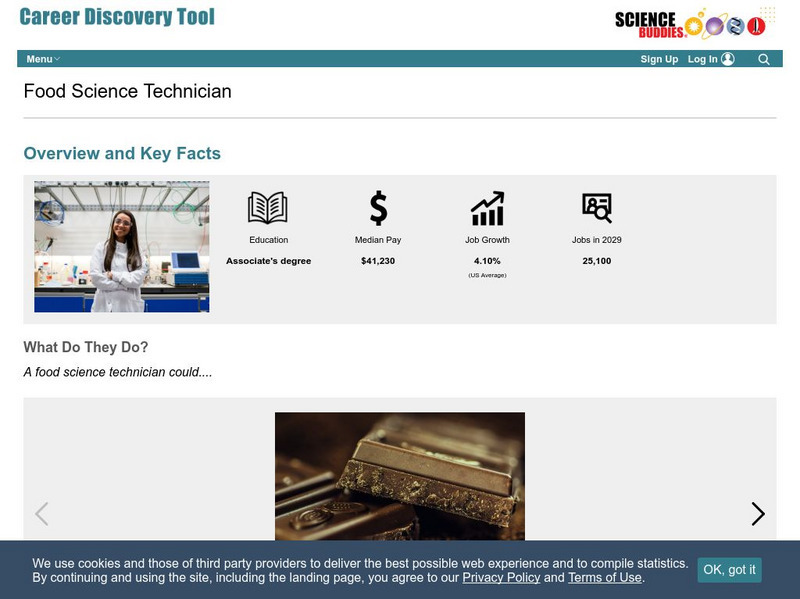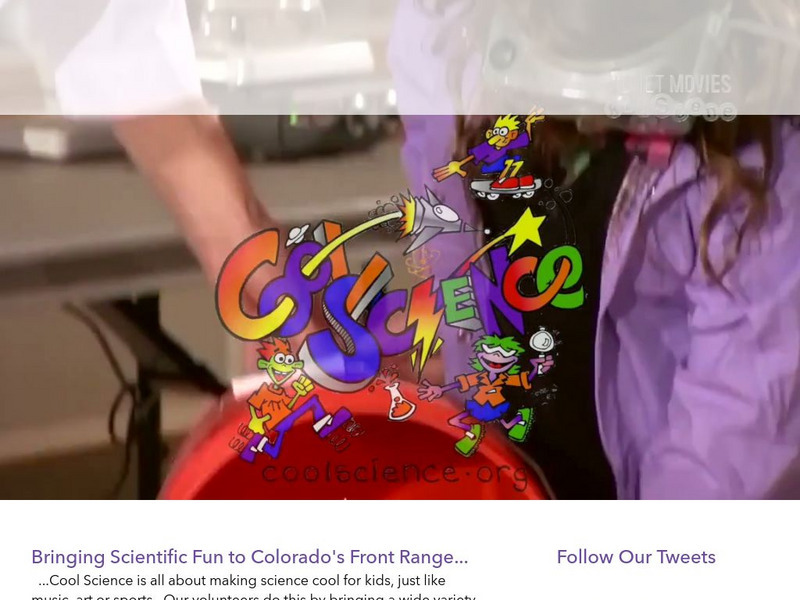Science Buddies
Science Buddies: Career Profile: Food Science Technician
Liking to eat is not a necessary requirement for a food science technician, but liking to work in a laboratory is. Find out the range of jobs a food science technician might perform in assessing food quality. Science Buddies offers a...
Science Buddies
Science Buddies: Slime Chemistry
Have you ever wondered how fun toys like Silly Putty, Gak, and Slime are made? These products are so much fun because of the properties of polymers, which make them delightfully bouncy, stretchy, sticky, moldable, breakable, hard, soft,...
Other
Cool Science
This non-profit organization brings "cool" science programs to schools in the Pikes Peak, CO area, but the website also provides exciting videos, experiments, and links to online users. Watch real chemistry and physics experiments and...
Other
Funology: The Science of Having Fun
See what the "science of having fun" is by learning jokes and "wacky facts", playing games, and trying magic tricks and simple recipes. Great ideas for enjoying science with classmates, friends, and family.
Ducksters
Ducksters: Physics for Kids: Electrical Conductors and Insulators
Kids learn about electrical conductors and insulators in the science of electricity and physics including materials, superconductors, and semiconductors.
Ducksters
Ducksters: Physics for Kids: Kinetic Energy
Kids learn about kinetic energy in the science of physics. The energy of motion can be calculated using mass and velocity. The standard unit is the joule. How it is different from potential energy.
Ducksters
Ducksters: Physics for Kids: Lenses and Light
Kids learn about lenses and light in the science of physics including concave, convex, converging, diverging, focal point, meniscus, and Plano lenses.
Ducksters
Ducksters: Physics for Kids: Behavior of Light as a Wave
Kids learn about the behavior of light as a wave in the science of physics including reflection, refraction, and diffraction.
Ducksters
Ducksters: Physics for Kids: Mass and Weight
Kids learn about mass and weight in the science of physics and the laws of motion including units and measurement. What is the difference between mass and weight?
Ducksters
Ducksters: Physics for Kids: Momentum and Collisions
Kids learn about momentum and collisions in the science of physics and the laws of motion including units and measurement. Calculate momentum using mass times velocity.
Ducksters
Ducksters: Physics for Kids: Ohm's Law
Kids learn about Ohm's law in the science of electricity and physics including current, resistance, voltage, example problems, and V=IR.
Ducksters
Ducksters: Physics for Kids: Photons and Light
Kids learn about photons in the science of physics, the particles of energy that make up light including properties and how they interact with matter.
Ducksters
Ducksters: Physics for Kids: Potential Energy
Kids learn about potential energy in the science of physics. The energy of position and state can be calculated using mass, gravity, and height. The standard unit is the joule. How it is different from kinetic energy.
Ducksters
Ducksters: Physics for Kids: Power
Kids learn about power in the science of physics and the laws of motion including units and measurement in watts. Calculate power using work divided by time.
Ducksters
Ducksters: Physics for Kids: Pressure
Kids learn about pressure in the science of physics and the laws of motion including units and measurement in pascals. Calculate pressure using force divided by area.
Ducksters
Ducksters: Physics for Kids: Resistors, Capacitors, and Inductors
Kids learn about resistors, capacitors, and inductors in the science of electronics and physics including measurement, symbols, and standard units.
Ducksters
Ducksters: Physics for Kids: Scalars and Vectors
Kids learn about scalars and vectors in the science of physics. Scalars are magnitude only while vectors have magnitude and direction. Examples and differences and how to draw a vector.
Ducksters
Ducksters: Physics for Kids: Nuclear Energy and Fission
Kids learn about nuclear energy and fission in the science of physics including E=mc2, power plants, uses of nuclear power, and fusion.
Ducksters
Ducksters: Physics for Kids: Motion Glossary and Terms
Kids learn about glossary and terms in the science of physics and motion. Definitions for words such as momentum, force, work, energy, gravity, scalar, vector, power, and more.
Ducksters
Ducksters: Physics for Kids: Acceleration
Kids learn about acceleration in the science of physics and the laws of motion including units and measurement. How to calculate it from the change in velocity over the change in time.
Ducksters
Ducksters: Physics for Kids: Electric Current
Kids learn about electric current in the science of physics including the flow of electrons, measurement, alternating, and direct current.
Ducksters
Ducksters: Physics for Kids: Electricity Glossary and Terms
Kids learn about electricity glossary and terms in the science of physics. Words and definitions you need to know such as current, voltage, resistance, and more.
Ducksters
Ducksters: Physics for Kids: Electricity in Nature
Kids learn about electricity in nature the science of physics including lightning, animals, the human body, the Earth, and static electricity.
Ducksters
Ducksters: Physics for Kids: Electromagnetism and Electric Motors
Kids learn about electromagnetism and electric motors in the science of electricity and physics including the right-hand rule, generation, and induction.
Other popular searches
- 4th Grade Physical Science
- Physical Science Matter
- Elementary Physical Science
- Physical Science Projects
- Physical Science "Motion
- Physical Science Activities
- Physical Science Lessons
- Physical Science "Motion"
- 5e Physical Science Lessons
- Physical Science Space
- Physical Science Technology
- Physical Science Content






















